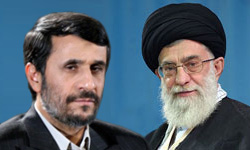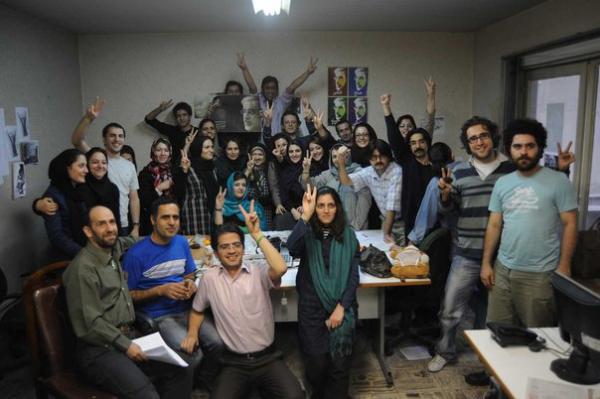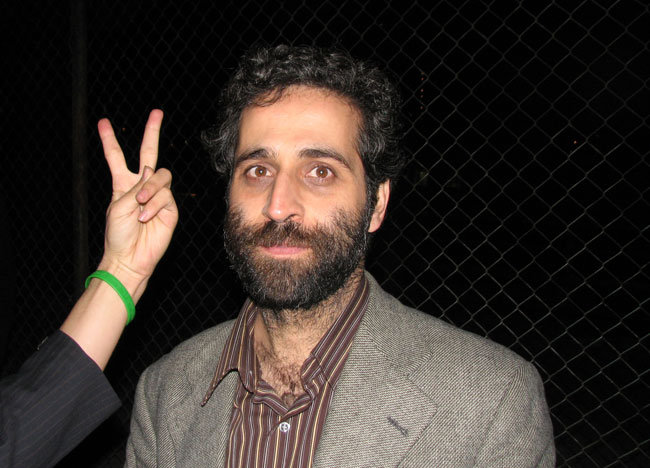Friday
Mar052010
The Latest from Iran (5 March): Re-aligning
 Friday, March 5, 2010 at 16:31
Friday, March 5, 2010 at 16:31  2030 GMT: Academic Special. We've posted an entry noting how Iran's regime and America's self-proclaimed "Truthful Encyclopedia", Conservapedia, have allied against deviant professors.
2030 GMT: Academic Special. We've posted an entry noting how Iran's regime and America's self-proclaimed "Truthful Encyclopedia", Conservapedia, have allied against deviant professors.NEW University Special: Iran & Conservapedia Ally Against Dangerous Professors
Death, Confusion, and Clerics in Iran: The Case of Mohammad Amin Valian
Iran Film Special: Watching Shrek in Tehran
The Latest from Iran (4 March): A Death Penalty Mystery
2015 GMT: Karroubi Watch. Iranian authorities have prevented the son of Mehdi Karroubi, Professor Mohammad Taghi Karroubi, from flying to Britain. Mohammad Karroubi's passport was seized at the airport.
Mehdi Karroubi's website, Saham News, reported, "[Mohammad Karroubi] was planning to fly to London for university related work, including the re-publication of his book 'Just or Unjust War?' and the completion of another book related to international law."
1915 GMT: The Valian "Mohareb" Case. The US Government, shifting its attention from the nuclear issue, has called on Iran to release Mohammad Amin Valian, allegedly condemned to death for protests between July and December: "We find this disproportionate punishment deplorable and urge his immediate release. If the Iranian government wants the respect of the international community, it must respect the fundamental freedoms of its people."
1905 GMT: Smoke Screen. In a letter to "Western" media, the editors of six Iranian websites associated with "principlist" politicians have complained about the presentation of post-election events, accusing the Western outlets of distorting events in Iran and acting “unprofessionally.”
The operators of Alef, Tabnak, Jahan, Khabar Online, Farda, and Hamshahri Online websites, asking the Western journalists to use “professional conscience" to review events, focus on the case of Neda Agha-Soltan, killed by a Basiji gunman:
Since the Iranian government was struggling to calm the public and the opposition sought to whip up excitement, in your opinion which side could expect to gain from murdering Neda?....How are the inconsistencies in remarks made by Arash Hejazi in the video clip that is available and the BBC interview where he provides details justifiable? And as a more general question, how credible is the story when an assassination on a quiet street prompts passersby to move closer to film the victim up close instead of fleeing the scene? Did you consider such skepticism before you publicized the story? Was your conduct professional?
The letter continues with the report of the rape and murder of Taraneh Mousavi, a claim which proved to be unsubstantied, accuse Western media of reporting on the news by resorting to an “obscure blog.”
1855 GMT: The Clerical Challenge (cont.). Remember Mr Verde's column yesterday on how the Supreme Leader and the regime may have let themselves in for some religious trouble over the alleged death sentence handed out to 20-year-old Mohammad Amin Valian as "mohareb" (warrior against God)?
Well, Ayatollah Bayat-Zanjani has joined Ayatollah Sane'i in criticism of the "justice" in the Valian case: "Mohareb are those who attack people with arms and shed their blood, not protesters."
1630 GMT: Political Prisoner Watch. Reports claim that the head of Mir-Hossein Mousavi’s presidential campaign in Shahinshahr in Isfahan Province has been in prison since 11 February.
Prominent reformist Behzad Nabavi was released for five days on Wednesday night.
The sentence for journalist and economist Saeed Leylaz has been reduced to three years.
1500 GMT: Well, Here's a Surprise. The pro-Larijani Khabar Online prints a sustained attack on the foreign policy of the Ahmadinejad Government, notably its pursuit of Iran's nuclear case.
1455 GMT: Rafsanjani Watch. Rah-e-Sabz continues to press the line that Hashemi Rafsanjani is keeping his distance from the Government. The website claims that Rafsanjani, his ally Hassan Rouhani, and former Presidential candidate Ali Akbar Nategh Nouri are staying away from meetings of the Combatant Clergy Association because of their differences with the group.
1445 GMT: Another Warning to Mousavi. Iran's Prosecutor-General Gholam-Hossein Mohseni-Ejeie has attacked Mir Hossein Mousavi: If a Government cannot pursue someone because of his attachments [Note: Attachments to whom or what?], that is a deviation. People expect Mousavi's public punishment.
0740 GMT: Yesterday's Top Statement. Mahmoud Ahmadinejad announced:
Our atomic bombs are our youth and athletic heroes. A nation that possesses determination, intellect, culture and civilization doesn't need to make atomic bombs. Those who suffer from inferiority complex and lack a historical background and civilization are the ones that claim they need atomic bombs.
0725 GMT: Washington Endorses A Nuclear Deal? Perhaps the most significant Iran-related signal that will be missed today....
US Deputy Secretary of State Jim Steinberg met Japanese Foreign Minister Katsuya Okada yesterday on the Iran issue. Steinberg's media statement was bland:
Japan plays a very critical role on this question. It's a leader and a very strong voice in supporting a non-proliferation regime with a very strong commitment to dealing with the challenge of nuclear weapons.
But for those who can de-code diplomatic statements, the Deputy Secretary offered an important signal: "(Japan) is very influential with Iranians and can have a very big impact....(I am) grateful for the strong statements they made during a recent visit by Iranian officials here."
The significance is missed by Agence France Presse, which reports the statement. That "visit by Iranian officials" was the occasion for Speaker of Parliament Ali Larijani to embrace a "third-party" deal in which Japan would enrich Iran's uranium stock to 20 percent.
So now what do you think Steinberg was discussing with Foreign Minister Okada?
0640 GMT: The Sanctions Dance. Outside Iran, a lot of attention will be expended on the continuing discussion of tougher sanctions on Tehran. Brazil's pointed rejection, made during US Secretary of State Hillary Clinton's visit, has checked the momentum --- whipped up in the media --- for an American resolution in the UN Security Council. The Council on Foreign Relations has a useful analysis.
Clinton is now talking about "months", rather than "weeks", for a US initiative. That may not be a bad thing for Obama, who reportedly is sceptical of the impact of further economic measures, but the battle will now move to the US Congress, which continues to press for sweeping rather than gradual sanctions.
0625 GMT: And so the end of another week in Iran. Beyond the bluster of the regime, most of the daily news has concerned political prisoners: some released, usually on bail and commanded to silence or face a return to jail, others swept up and detained. A case we had not noted before: Radio Farda reports that student Ali Kanturi has been sentenced to 15 years for "abduction" and "extortion".
The regime's heavy hand, despite all the tensions and confusions within the Government, does seem to have quelled public protest. Perhaps most notable is that there do not appear to be the university demonstrations that marked the period between 13 Aban (4 November) and Ashura (27 December). With the regime also continues to try and choke off the opposition media, the public face of resistance now comes primarily through the statements and interviews of figures like Mir Hossein Mousavi and Mehdi Karroubi.
Of course, that does not mean that resistance has been quelled. It is more a case that, in this period between 22 Bahman and the Iranian New Year, it lies smoldering. Another crisis or mis-step by the Government could bring it to the fore; more likely, however, is that the challenge to President Ahmadinejad and, indeed, to the Iranian system will come through erosion.
Not an erosion of legitimacy --- the point that should not be forgotten is that legitimacy has been beyond this Government for many Iranians --- but an erosion of authority as the economy stumbles and there is no visible sign of the "unity" that the regime trumpets again and again in its pronouncements.
That is why the curious "death penalty" case of student Mohammad Amin Valian raises interest. As the affair unfolds, with no confirmation that the Ashura protester has actually been condemned to die, the disquiet and now open opposition of clerics indicates that the Government will continue to face problems --- and the Supreme Leader will be pressured --- over the notion of "justice".
tagged  Alef,
Alef,  Ali Akbar Nategh-Nouri,
Ali Akbar Nategh-Nouri,  Ali Kanturi,
Ali Kanturi,  Ali Larijani,
Ali Larijani,  Ashura,
Ashura,  Ayatollah Ali Khamenei,
Ayatollah Ali Khamenei,  Ayatollah Bayat-Zanjani,
Ayatollah Bayat-Zanjani,  Ayatollah Yusuf Sane'i,
Ayatollah Yusuf Sane'i,  Barack Obama,
Barack Obama,  Behzad Nabavi,
Behzad Nabavi,  Brazil,
Brazil,  Combatant Clergy Association,
Combatant Clergy Association,  Conservapedia,
Conservapedia,  Council on Foreign Relations,
Council on Foreign Relations,  Farda,
Farda,  Gholam-Hossein Mohseni-Ejeie,
Gholam-Hossein Mohseni-Ejeie,  Hamshahri Online,
Hamshahri Online,  Hashemi Rafsanjani,
Hashemi Rafsanjani,  Hassan Rohani,
Hassan Rohani,  Hillary Clinton,
Hillary Clinton,  Iran,
Iran,  Iran Elections 2009,
Iran Elections 2009,  Jahan,
Jahan,  Japan,
Japan,  Jim Steinberg,
Jim Steinberg,  Kamran Daneshjoo,
Kamran Daneshjoo,  Katsuya Okada,
Katsuya Okada,  Khabar Online,
Khabar Online,  Mahmoud Ahmadinejad,
Mahmoud Ahmadinejad,  Mehdi Karroubi,
Mehdi Karroubi,  Mir Hossein Mousavi,
Mir Hossein Mousavi,  Mohammad Amin Valian,
Mohammad Amin Valian,  Mohammad Taghi Karroubi,
Mohammad Taghi Karroubi,  Radio Farda,
Radio Farda,  Saeed Laylaz,
Saeed Laylaz,  Saham News,
Saham News,  Tabnak,
Tabnak,  Taraneh Mousavi in
Taraneh Mousavi in  Middle East & Iran
Middle East & Iran
 Alef,
Alef,  Ali Akbar Nategh-Nouri,
Ali Akbar Nategh-Nouri,  Ali Kanturi,
Ali Kanturi,  Ali Larijani,
Ali Larijani,  Ashura,
Ashura,  Ayatollah Ali Khamenei,
Ayatollah Ali Khamenei,  Ayatollah Bayat-Zanjani,
Ayatollah Bayat-Zanjani,  Ayatollah Yusuf Sane'i,
Ayatollah Yusuf Sane'i,  Barack Obama,
Barack Obama,  Behzad Nabavi,
Behzad Nabavi,  Brazil,
Brazil,  Combatant Clergy Association,
Combatant Clergy Association,  Conservapedia,
Conservapedia,  Council on Foreign Relations,
Council on Foreign Relations,  Farda,
Farda,  Gholam-Hossein Mohseni-Ejeie,
Gholam-Hossein Mohseni-Ejeie,  Hamshahri Online,
Hamshahri Online,  Hashemi Rafsanjani,
Hashemi Rafsanjani,  Hassan Rohani,
Hassan Rohani,  Hillary Clinton,
Hillary Clinton,  Iran,
Iran,  Iran Elections 2009,
Iran Elections 2009,  Jahan,
Jahan,  Japan,
Japan,  Jim Steinberg,
Jim Steinberg,  Kamran Daneshjoo,
Kamran Daneshjoo,  Katsuya Okada,
Katsuya Okada,  Khabar Online,
Khabar Online,  Mahmoud Ahmadinejad,
Mahmoud Ahmadinejad,  Mehdi Karroubi,
Mehdi Karroubi,  Mir Hossein Mousavi,
Mir Hossein Mousavi,  Mohammad Amin Valian,
Mohammad Amin Valian,  Mohammad Taghi Karroubi,
Mohammad Taghi Karroubi,  Radio Farda,
Radio Farda,  Saeed Laylaz,
Saeed Laylaz,  Saham News,
Saham News,  Tabnak,
Tabnak,  Taraneh Mousavi in
Taraneh Mousavi in  Middle East & Iran
Middle East & Iran 





